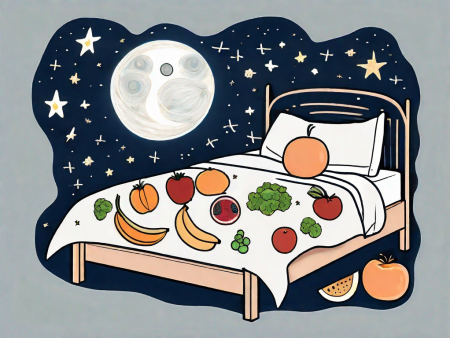Discover the fascinating connection between mental health and energy levels in this insightful article.
How Mental Health and Energy Levels Correlate
Do you ever find yourself in a mental fog, struggling to find the energy to get through the day? Well, you’re not alone! It turns out that there is a fascinating connection between our mental health and our energy levels. So, grab a cup of coffee (or your beverage of choice) and let’s dive into the world of mental health and energy!

Understanding the Basics of Mental Health
Before we unravel the mysteries of mental health and energy, let’s first understand what mental health is all about. Mental health encompasses our emotional, psychological, and social well-being. It affects how we think, feel, and act, ultimately shaping our ability to handle stress, build relationships, and make decisions.
Mental health is a complex and multifaceted aspect of our overall well-being. It is not just the absence of mental illness, but rather a spectrum that ranges from flourishing and thriving to struggling and experiencing mental health disorders. It is important to recognize that mental health is a continuum, and each individual’s experience with it is unique.
Defining Mental Health
Now, let’s define mental health. It’s not just about mental illness, my friend. Mental health is a spectrum that ranges from flourishing and thriving to struggling and experiencing mental health disorders. It encompasses various aspects of our lives, including our thoughts, emotions, behaviors, and social interactions.
At its core, mental health is about finding a balance between our internal and external worlds. It involves developing resilience, coping skills, and a sense of self-awareness to navigate the challenges and complexities of life.
Common Mental Health Disorders
We’re all unique individuals, and so too are the mental health challenges we may face. Common mental health disorders include anxiety disorders, depression, bipolar disorder, and eating disorders. These disorders can have a significant impact on our lives, affecting our thoughts, emotions, and behaviors.
Anxiety disorders, such as generalized anxiety disorder and panic disorder, can cause excessive worry, fear, and restlessness. Depression, on the other hand, can lead to persistent feelings of sadness, loss of interest, and a lack of energy. Bipolar disorder is characterized by extreme mood swings, ranging from manic episodes of heightened energy and euphoria to depressive episodes of low mood and lethargy. Eating disorders, such as anorexia nervosa and bulimia nervosa, involve unhealthy relationships with food and body image.
It is important to note that mental health disorders are not a reflection of weakness or personal failure. They are legitimate medical conditions that require understanding, support, and appropriate treatment.
The Impact of Mental Health on Daily Life
Picture this: you wake up feeling low on energy, and your mental health is taking a toll. Suddenly, everything feels like an uphill battle. It becomes harder to focus, find motivation, and engage with the world around you. This is where mental health starts to intertwine with our energy levels.
When our mental health is compromised, it can have a profound impact on various aspects of our daily life. It can affect our ability to concentrate, make decisions, and perform tasks efficiently. It can also influence our relationships, as we may struggle with communication, empathy, and maintaining healthy connections with others.
Furthermore, mental health can impact our physical well-being. Chronic stress, often associated with mental health challenges, can lead to physical symptoms such as headaches, muscle tension, and sleep disturbances. It can also weaken our immune system, making us more susceptible to illnesses.
Recognizing the interconnectedness of mental health and overall well-being is crucial in promoting a holistic approach to self-care. Taking care of our mental health not only benefits our emotional and psychological state but also enhances our physical health and overall quality of life.
The Role of Energy in Our Lives
Now, let’s shift our focus to the importance of energy in our lives. Energy is more than just feeling awake; it’s the fuel that keeps us going and helps us tackle life’s challenges with gusto!
Energy is a fundamental aspect of our existence, permeating every aspect of our lives. It is the driving force behind our actions, thoughts, and emotions. Without energy, we would be unable to accomplish even the simplest of tasks. From the moment we wake up in the morning to the time we go to bed at night, energy is constantly at work, propelling us forward.
Energy: More Than Just Feeling Awake
Energy isn’t just about bouncing out of bed in the morning or relying on that extra shot of espresso. It’s about having the vitality and stamina to do the things we love, stay focused, and cope with the demands of our daily lives.
Imagine a world without energy. We would be unable to pursue our passions, engage in meaningful relationships, or contribute to society. Energy enables us to seize the day and make the most of every opportunity that comes our way.
Factors Affecting Energy Levels
Many factors can influence our energy levels. These include our sleep patterns, diet, physical activity, and overall lifestyle choices. It’s like a delicate balancing act, and when one piece of the puzzle is off, our energy levels can take a hit.
When it comes to sleep, getting an adequate amount is crucial for replenishing our energy reserves. A restful night’s sleep allows our bodies to repair and rejuvenate, ensuring we wake up feeling refreshed and ready to take on the day.
Our diet also plays a significant role in our energy levels. Fueling our bodies with nutritious foods provides the necessary nutrients and vitamins to sustain our energy throughout the day. On the other hand, consuming excessive amounts of sugary or processed foods can lead to energy crashes and feelings of fatigue.
Physical activity is another key factor in maintaining optimal energy levels. Engaging in regular exercise increases blood flow, releases endorphins, and improves overall cardiovascular health. These benefits translate into increased energy and a greater sense of well-being.
Lastly, our lifestyle choices have a profound impact on our energy levels. Chronic stress, for example, can deplete our energy reserves and leave us feeling drained. On the other hand, engaging in activities that bring us joy and fulfillment can boost our energy and enhance our overall quality of life.
The Consequences of Low Energy
Low energy levels can have a significant impact on our mental well-being. When we’re feeling drained and lethargic, it becomes challenging to stay positive, motivated, and engage in self-care practices. It can create a vicious cycle where our mental health suffers, and our energy levels plummet even further.
Furthermore, low energy can hinder our productivity and limit our ability to accomplish our goals. We may find ourselves struggling to concentrate, lacking the motivation to tackle tasks, and feeling overwhelmed by even the simplest of responsibilities.
It is essential to recognize the signs of low energy and take proactive steps to address them. This may involve making lifestyle changes, seeking support from healthcare professionals, or implementing stress-management techniques.
In conclusion, energy is a vital component of our lives, influencing our physical, mental, and emotional well-being. By understanding the factors that affect our energy levels and taking steps to maintain and enhance them, we can lead more fulfilling and energized lives.
The Connection Between Mental Health and Energy Levels
So, how exactly are mental health and energy levels connected, you ask? Well, my friend, the relationship is a complex dance between our mind and body.
Let’s dive deeper into this intriguing connection. When it comes to energy levels, they play a significant role in our psychological well-being. Just like a car running on low fuel, our mental battery can also become drained when our energy levels are low. This depletion can contribute to a range of psychological effects, such as irritability, mood swings, and difficulty concentrating. It’s like trying to work on an ancient computer with a dying battery – frustrating, isn’t it?
On the flip side, our mental health can also influence our energy levels. When we’re experiencing mental health challenges, such as excessive worry or feeling down, it can zap our energy and leave us feeling depleted. It’s as if our mind and body are intertwined, with our mental state directly impacting our physical vitality.
But here’s an interesting twist – energy levels can also serve as a symptom of underlying mental health issues. Think of energy levels as a little red warning light on the dashboard of our mental health. When our energy levels consistently plummet or soar, it can be a clue that something deeper is going on. It’s like our body speaking a secret language, whispering, “pay attention!”
So, what does this mean for our overall well-being? Understanding the connection between mental health and energy levels can help us navigate our own experiences and support others who may be struggling. By recognizing the impact of low energy on our mental state and vice versa, we can take proactive steps to prioritize self-care and seek appropriate support when needed.
Remember, mental health and energy levels are not isolated entities but rather intertwined aspects of our overall well-being. By nurturing our mental health and maintaining healthy energy levels, we can strive for a more balanced and fulfilling life.
Strategies to Improve Mental Health and Boost Energy

Alright, let’s not dwell on the negatives any longer. It’s time to explore some strategies to improve both our mental health and boost our energy levels. Are you ready?
When it comes to enhancing our mental health and energy, there are various approaches we can take. One powerful way is through lifestyle changes. By prioritizing regular exercise, we not only improve our physical fitness but also release endorphins, those magical chemicals that lift our mood and increase our energy levels. Establishing a sleep routine is another important aspect of our lifestyle that can greatly impact our mental well-being and energy. Getting enough restful sleep allows our bodies and minds to recharge, helping us feel refreshed and ready to take on the day.
Practicing stress management techniques is also crucial in maintaining good mental health and energy levels. Whether it’s through meditation, deep breathing exercises, or engaging in activities that help us relax, finding effective ways to manage stress can significantly improve our overall well-being. Additionally, ensuring we have time for activities that bring us joy is essential. Whether it’s pursuing a hobby, spending time with loved ones, or simply taking a break to do something we enjoy, these moments of happiness can have a profound impact on our mental health and energy.
In some cases, seeking support from mental health professionals can help us navigate the complexities of our mental health and energy levels. Therapeutic approaches such as cognitive-behavioral therapy and mindfulness techniques can equip us with valuable tools to manage stress, enhance our energy, and promote overall mental well-being. Through these therapeutic approaches, we can gain a deeper understanding of ourselves, develop healthier coping mechanisms, and cultivate a positive mindset.
Let’s not forget the power of what we put into our bodies. A balanced diet rich in nutrients can provide the fuel our minds and bodies need. Foods that are high in vitamins, minerals, and antioxidants can support brain function and improve our energy levels. Incorporating foods like fruits, vegetables, whole grains, and lean proteins into our diet can have a significant impact on our mental well-being and energy.
Regular exercise and a healthy diet often go hand in hand. Engaging in physical activity not only boosts our physical fitness but also releases endorphins, as mentioned earlier. These endorphins act as natural mood lifters, helping us combat stress, anxiety, and depression. Whether it’s going for a run, practicing yoga, or participating in a team sport, finding an exercise routine that we enjoy can greatly contribute to our mental health and energy.
So, my friend, there you have it – the fascinating world of how mental health and energy levels correlate. Remember, it’s a dance between our mind and body, and by prioritizing our mental well-being and energizing our lives, we can achieve a harmonious balance. Now go out there and conquer the world – with a clear mind and boundless energy!








I’m thoroughly captivated with your deep insights and superb writing style. Your depth of knowledge clearly stands out in each paragraph. It’s clear that you spend considerable time into researching your topics, and that effort is well-appreciated. We appreciate your efforts in sharing such detailed information. Keep on enlightening us! https://www.elevenviral.com
Great read here! Appreciate the information. Check out https://thefoundationkings.com/ for Toronto Underpinning.
I’m truly impressed by the profound understanding and excellent ability to convey information. The knowledge you share shines through in every piece you write. It’s obvious that you invest a great deal of effort into understanding your topics, and the results pays off. We appreciate your efforts in sharing this valuable knowledge. Keep on enlightening us! Learn more about our OnlyFans Agency: https://elevenviral.com/onlyfans-marketing-growth-service/